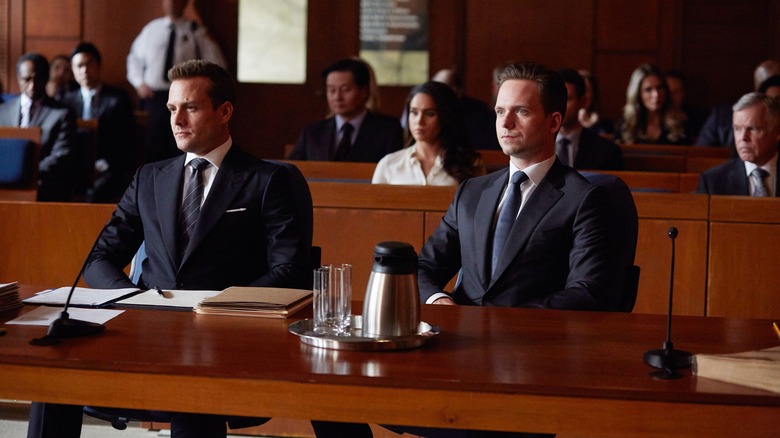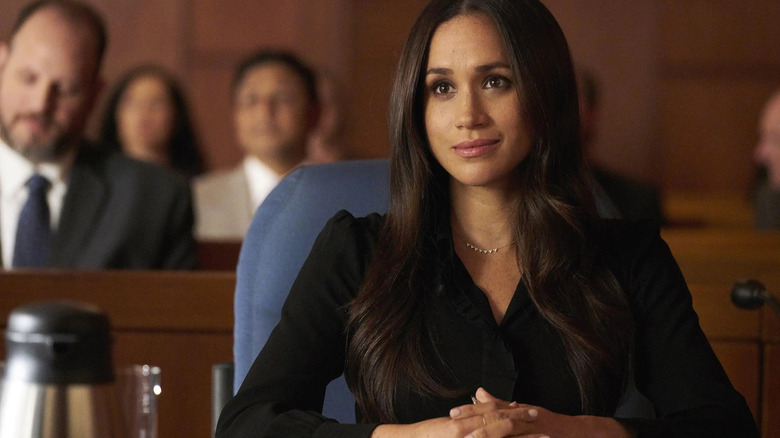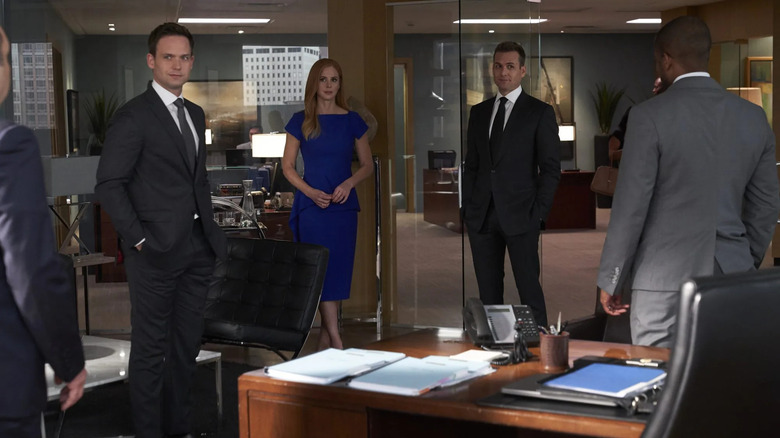Here's Why Suits Was Cancelled (And If It Could Ever Come Back)
The hottest streaming show of the summer is not a new and exciting series, but actually a 12-year-old legal drama that ended before the pandemic began. Indeed, "Suits" is the most popular show on streaming at the moment, breaking record after record. According to Nielsen (via Deadline), it has been streamed twice as much as the next title ("The Lincoln Lawyer").
This renewed interest in the USA Network show thanks to streaming has many new fans wondering just what happened to "Suits," why it ended after nine seasons, and whether there's a chance it could come back.
Well, for the first part, the answer is both simple and a bit complicated. The cast of the show was under a contract only until the end of season 7, after which both Patrick J. Adams and Meghan Markle departed (the latter for rather well-documented reasons). In an interview with Deadline about the final season, creator Aaron Korsh said that he approached the network ahead of season seven to figure out a plan, and they negotiated for two more seasons, with a shortened season nine being set as the end of the show.
"During the course of season 7, as they were negotiating the cast's contracts for two years, an unforeseen thing happened. You can never know that one of your stars is going to marry the Prince of England, and Patrick decided not to return, so we had a choice whether to keep going after season 7."
The f-word: filler
There are many reasons why a show like "Suits" would be so popular in 2023. For one, the legal drama is a tried and tested genre of TV that is always relevant. Also, in "Suits," a lot of drama and thrill come from power plays and ambitious characters betraying each other and doing back deals, which can make this a good option for those craving a new "Succession."
And, of course, the show is just that good. Plus it is full of plenty of big-name actors and guest stars, like Gina Torres, the aforementioned Meghan Markle, Wendell Pierce and more.
Then there's the simple fact that "Suits" has 134 episodes, each running at around 42 minutes. There is something special and comforting about watching a show with many episodes because you can simply watch it in the background, or when you don't know what else to watch, and you know you can keep doing that for a long time. The beauty of network shows with long seasons that need padding to reach their episode orders is that you get to know the characters better than any 8-episode season can. Yes, I'm talking about the dreaded f-word: filler. When you think about modern sitcoms, it is hard to come up with a show that is anywhere near as popular as something like "Friends" was, or like "Seinfeld" was.
In no small part, this is because the traditional order of over 20 episodes is nonexistent in streaming. This has led to the unfortunate and quite misleading idea of turning TV shows into just long movies. More often than not, these shorter seasons feel bloated, because they try to fit in more in a shorter time, rather than let the story breathe and the characters grow and develop over time.
Is there a future for Suits?
So "Suits" is a big deal again — now what? Could it get a second life? Executive producer Gene Klein talked to TVLine about the show's success in streaming and the possibility of a return. "I, obviously, had a sense when I found out it was coming to Netflix [that] it would probably get another burst of viewing and that kind of thing, but I did not think this would happen," Klein said.
"In this era of reboots and reunions and all this other stuff [...] I'm expecting a call at some point," he continued. "But I'm not aware of any serious conversations."
It makes sense. After all, back in the early days of streaming before we knew Netflix was the start of a horrible tech bubble that would ruin the industry, they were known as the savior of cult shows. Netflix is often credited as a big reason why "Breaking Bad" went from a show critics liked to a universally praised modern classic. Likewise, it is easy to forget that one of the first Netflix original productions was a revival season of "Arrested Development," a beloved show that was canceled too soon.
The streamer is also responsible for the only good "Lost" copy, ABC's "Manifest," being able to continue and to finish telling its story, when Netflix picked it up after it got canceled by the original network. The same thing happened with "Lucifer," a show that got its life cut short before Netflix swooped in and saved it, giving it three more seasons.
Sadly, the days of Netflix taking in beloved, but not necessarily successful shows and giving them a second chance seems to be over, with the streamer announcing more cancellations than pick-ups, and the general cost-cutting measures being implemented across all of Hollywood.


